Resources (827 found)
သမၼတ၏ ဘက္ေတာ္သားမ်ားသာ ျဖစ္ၾကသည္ (All the President’s Men)
In the last year, the Myanmar National Human Rights Commission enabling law was passed, finally institutionalizing its mandate that will begin in 2015. The human rights situation in Burma certainly needs any instrument possible, with continuing abuses by the Burma Army, violations […]
• • •Critique of Japan International Cooperation Agency’s Blueprint for Development in Southeastern Burma/Myanmar
The Japan International Cooperation Agency (JICA) has recently issued a blueprint that proposes industrial development in Southeast Burma/Myanmar, purportedly to aid in the return and settlement of refugees and Internally Displaced Persons (IDPs) in Karen and Mon States. However, the Karen Peace Support Network (KPSN), a network of nearly 30 ethnic Karen organizations, cautions JICA that its blueprint for infrastructure development such as roads and industrial estates in the war-torn southeast is premature and flawed, potentially exacerbating conflict in the region.
The KPSN (formerly KCBPSN) is the largest network of Karen civil society organizations in Burma/Myanmar. These organizations have been providing support for vulnerable people in this conflict-torn region for decades, striving to empower local communities, build transparent and accountable institutions, and help create a sustainable peace in Burma/Myanmar. KPSN and its member organizations are important stakeholders which must be included in any development planning process in the Karen areas of the southeast […]
• • •Burma: USCIRF Examines Religious Freedom Violations During Fact-finding Trip to Burma
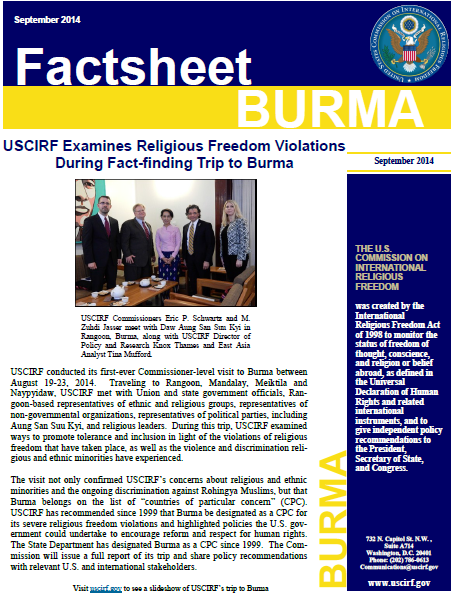 USCIRF conducted its first-ever Commissioner-level visit to Burma between August 19-23, 2014. Traveling to Rangoon, Mandalay, Meiktila and Naypyidaw, USCIRF met with Union and state government officials, Ran-goon-based representatives of ethnic and religious groups, representatives of non-governmental organizations, representatives of political parties, including Aung San Suu Kyi, and religious leaders. During this trip, USCIRF examined ways to promote tolerance and inclusion in light of the violations of religious freedom that have taken place, as well as the violence and discrimination reli-gious and ethnic minorities have experienced.
USCIRF conducted its first-ever Commissioner-level visit to Burma between August 19-23, 2014. Traveling to Rangoon, Mandalay, Meiktila and Naypyidaw, USCIRF met with Union and state government officials, Ran-goon-based representatives of ethnic and religious groups, representatives of non-governmental organizations, representatives of political parties, including Aung San Suu Kyi, and religious leaders. During this trip, USCIRF examined ways to promote tolerance and inclusion in light of the violations of religious freedom that have taken place, as well as the violence and discrimination reli-gious and ethnic minorities have experienced.
The visit not only confirmed USCIRF’s concerns about religious and ethnic minorities and the ongoing discrimination against Rohingya Muslims […]
• • •Two Years With No Moon: Immigration Detention of Children in Thailand
Every year, Thailand arbitrarily detains thousands of children, from infants and toddlers and older, in squalid immigration facilities and police lock-ups. Around 100 children—primarily from countries that do not border Thailand—may be held for months or years. Thousands more children—from Thailand’s neighboring countries—spend less time in this abusive system because Thailand summarily deports them and their families to their home countries relatively quickly. For them, detention tends to last only days or weeks.
But no matter how long the period of detention, these facilities are no place for children.
Drawing on more than 100 interviews, including with 41 migrant children, documenting conditions for refugees and other migrants in Thailand, this report focuses on how the Thai government fails to uphold migrants’ rights, describing the needless suffering and permanent harm that children experience in immigration detention. It examines the abusive conditions children endure in detention centers, particularly in the Bangkok Immigration Detention Center (IDC), one of the most heavily used facilities in Thailand […]
• • •2014 ANNI Report on the Performance and Establishment of National Human Rights Institutions in Asia
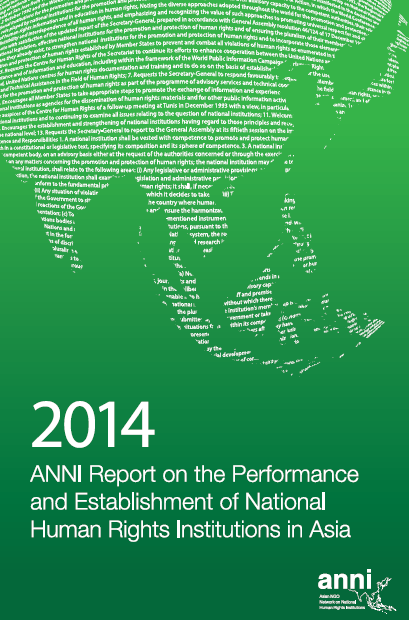 The Asian Forum for Human Rights and Development (FORUM-ASIA), as the Secretariat of the Asian NGO Network on National Human Rights Institutions (ANNI), humbly presents the publication of the 2014 ANNI Report on the Performance and Establishment of National Human Rights Institutions in Asia. Our sincere appreciation goes to all 31 ANNI member organisations from across 18 countries in Asia for their participation and commitment to ANNI and continued advocacy towards the strengthening and establishment of NHRIs in Asia. Similarly, we would also like to extend our sincere thanks to the National Human Rights Institutions (NHRIs) that have contributed valuable inputs and feeback to the concerned country reports. This year, the ANNI Secretariat is heartened at the level of engagement and interaction between ANNI members and their respective NHRIs in the course of the reportwriting process.
The Asian Forum for Human Rights and Development (FORUM-ASIA), as the Secretariat of the Asian NGO Network on National Human Rights Institutions (ANNI), humbly presents the publication of the 2014 ANNI Report on the Performance and Establishment of National Human Rights Institutions in Asia. Our sincere appreciation goes to all 31 ANNI member organisations from across 18 countries in Asia for their participation and commitment to ANNI and continued advocacy towards the strengthening and establishment of NHRIs in Asia. Similarly, we would also like to extend our sincere thanks to the National Human Rights Institutions (NHRIs) that have contributed valuable inputs and feeback to the concerned country reports. This year, the ANNI Secretariat is heartened at the level of engagement and interaction between ANNI members and their respective NHRIs in the course of the reportwriting process.
ANNI also expresses its thanks and appreciation to the Asia-Pacific Forum (APF) for its continued engagement with ANNI at various levels- most recently at the 7th ANNI Regional Consultation in Taiwan where joint advocacy action with national groups towards the establishment of an independent NHRI took place. At the same time, ANNI welcomes the engagement, for the first time, with the Civil Society and Human Rights Network (Afghanistan) […]
• • •Global Humanitarian Overview – Status Report
2014 has seen a major surge in humanitarian crises around the world. Inter-agency strategic response and regional response plans now target over 76 million people in thirty-one countries compared to 52 million in December 2013. 102 million people are estimated to be in need of humanitarian assistance compared to 81 million in December 2013. Global financial requirements to cover humanitarian needs rose from US$12.9 billion in 2013 to $17.3 billion now. More and more crises are having a regional impact with a spill-over effect on countries which are already fragile.
Five crises have been classified by Principals of the Inter-Agency Standing Committee as “L3 emergencies”. L3s are considered to be the highest level of crisis requiring sustained, top level, system-wide support focused on leadership and coordination to improve the effectiveness of humanitarian response efforts. The response to Typhoon Haiyan in the Philippines was declared an L3 emergency in November. An estimated 11.3 million people in nine regions of the Philippines were affected by Typhoon Haiyan. At least 6,201 people were killed and the force of the storm caused widespread destruction of homes and infrastructure in many towns […]
• • •South-East Asia: Irregular Maritime Movements (January-June 2014)
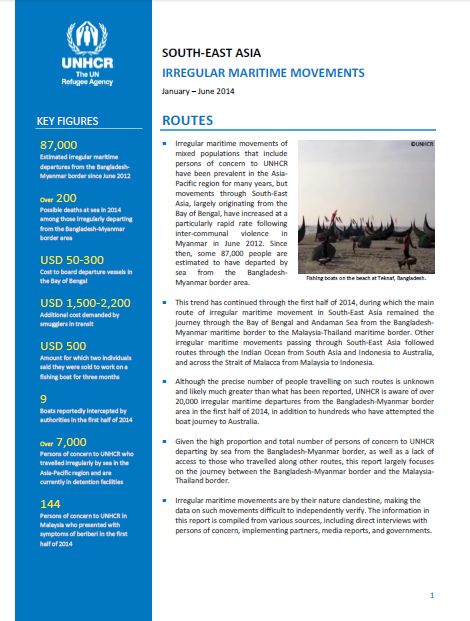 GENEVA, (UNHCR) – A new UNHCR report on irregular maritime movements in Southeast Asia estimates that 20,000 people risked their lives in sea crossings in the first half of this year. Many were Rohingya who fled Myanmar and arrived in the region suffering the effects of malnutrition and abuse during the journey. Several hundred people were also intercepted on boats heading to Australia.
GENEVA, (UNHCR) – A new UNHCR report on irregular maritime movements in Southeast Asia estimates that 20,000 people risked their lives in sea crossings in the first half of this year. Many were Rohingya who fled Myanmar and arrived in the region suffering the effects of malnutrition and abuse during the journey. Several hundred people were also intercepted on boats heading to Australia.
The report was produced by UNHCR’s Bangkok-based Maritime Movements Monitoring Unit, which collates information through interviews, and from media reports, partners and governments. It focuses on departures from the Bay of Bengal and elsewhere passing through Southeast Asia, and highlights the abuses people are facing on their journeys, and developments related to Australia’s Operation Sovereign Borders policy.
It also shows that more than 7,000 asylum-seekers and refugees who have travelled by sea are at present held in detention facilities in the region, including over 5,000 in Australia or its offshore processing centres in Nauru and Papua New Guinea […]
• • •January – June 2014: Report on the Human Rights Situation on Burma
The Network for Human Right Documentation-Burma (ND-Burma) is an organization that documents and reports human rights violations taking place throughout Burma. We are a watch-dog for human rights violations and are continually monitoring the human rights situation in Burma.
This report covers the first period of 2014 and focuses on 103 documented cases of human rights violations in Burma from January-June 2014. There are many serious human rights violations addressed and highlighted in this report, including: torture, extra-judicial killing, illegal arrests and detention, arbitrary taxation, property crimes, forced labor, human trafficking, forced displacement and rape.
Even though President U Thein Sein promised to release all political prisoners by the end of 2013, there are still many political prisoners in Burma, including new detainees in 2014. Many human right defenders and activists have been arrested under the Unlawful Association Act of 1908, Section 5 (e) and 5 (j) of the Emergency Provisions Act, and Section (18) of the Right to Peaceful Assembly and Peaceful Procession Act. For example, U Win Cho and U Nay Myo Zin were arrested under Section (18) for protesting the confiscation of land in Kyauk Ta Dar Township, Yangon. Moreover, innocent Kachin IDPs were arrested under Section (17) of the Unlawful Association Act for suspected contact with ethnic armed groups. These actions reinforce the fact that the government in Burma is still willing to use oppressive and unjust laws against the Burmese people […]
• • •What Refugees Say…
Between March‐April this year, focus group discussions were held with temporary returnees to SE Burma/ Myanmar from all 9 refugee camps along the Thailand‐Burma/ Myanmar border. The aim was to gain a snapshot of individual perspectives and concerns on current conditions on the ground, rather than conducting a formal survey representational of the whole refugee caseload.
The consultations focused on the conditions in the areas they returned to, the changes they and residents in those areas had detected since recent political and military shifts in the country, and their perceived current barriers to return.
The participants were identified by Section Leaders, with criteria that they must have returned to SE Burma/ Myanmar since the ceasefires were brokered, be adults, and that there should be some gender equity amongst them. In total, 85 temporary returnees participated in the consultations, with 35% being female. Over 100 others, comprising senior community leaders and CBO staff were also engaged through the process, although the main findings in this report only reflect the perspectives of those who had recently returned to their country of origin […]
• • •
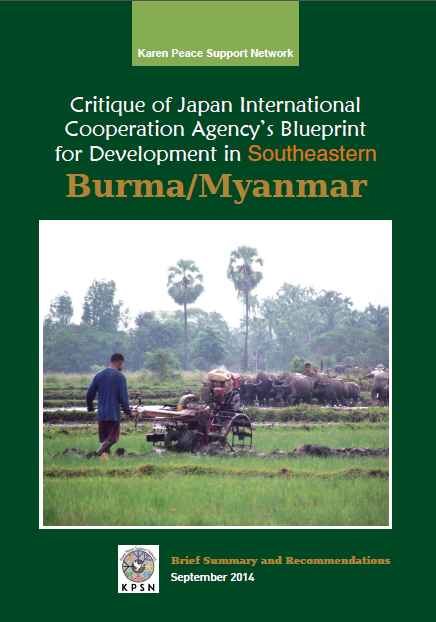
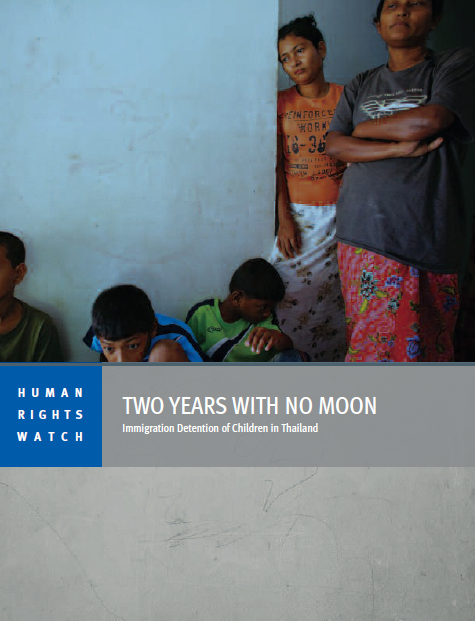
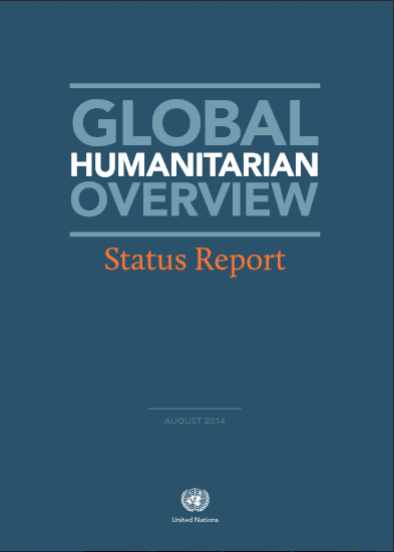
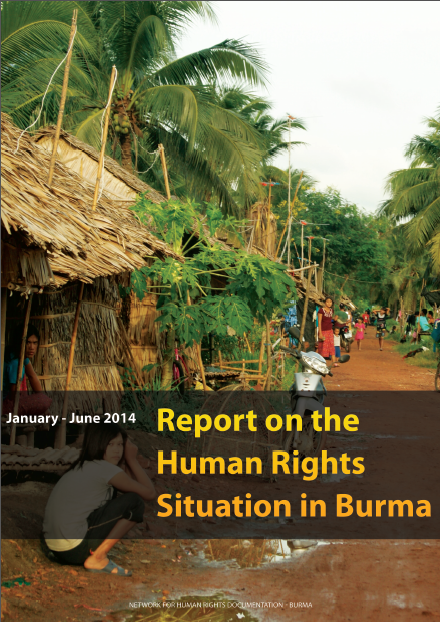
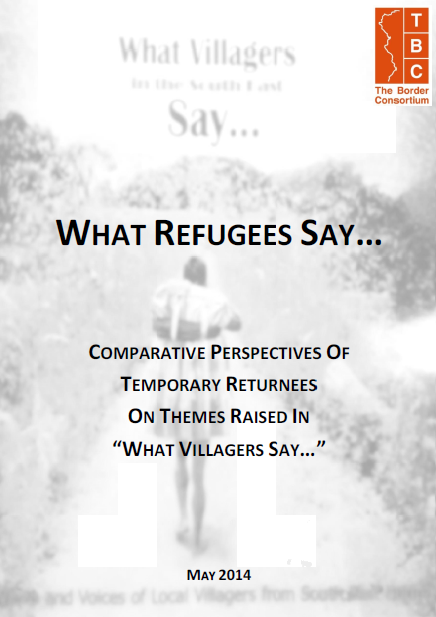








 All posts
All posts